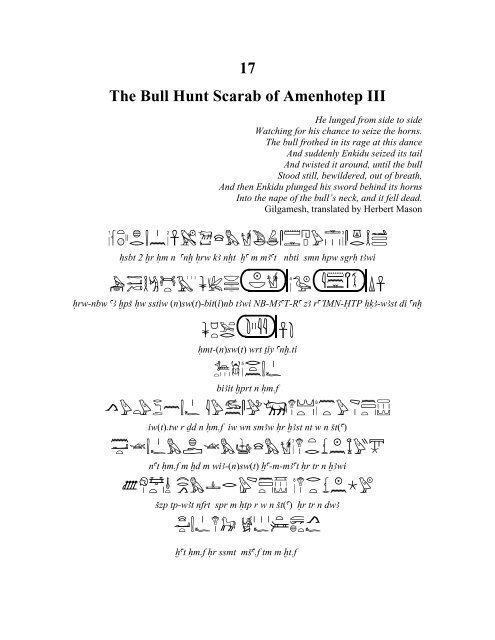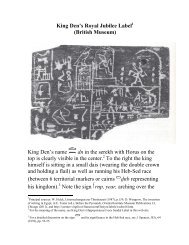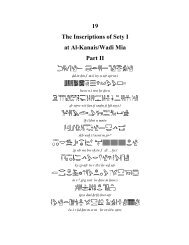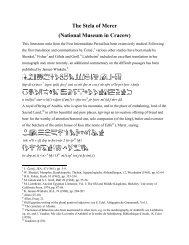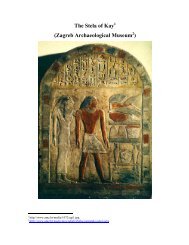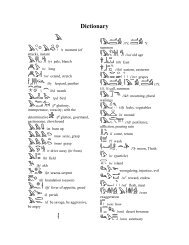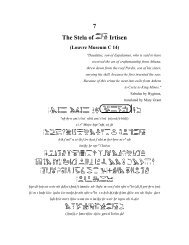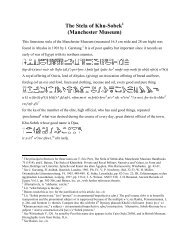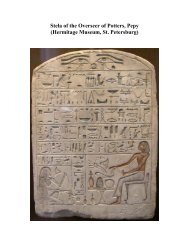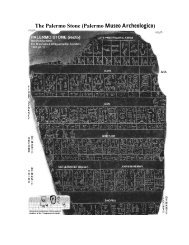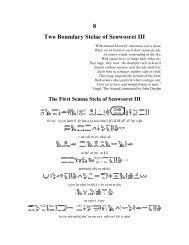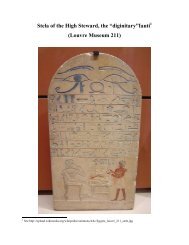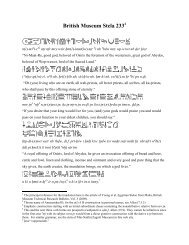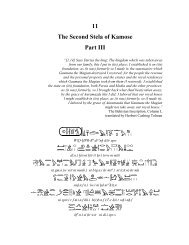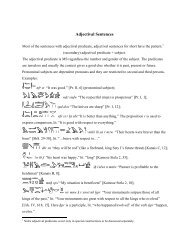17 The Bull Hunt Scarab of Amenhotep III - Middle Egyptian ...
17 The Bull Hunt Scarab of Amenhotep III - Middle Egyptian ...
17 The Bull Hunt Scarab of Amenhotep III - Middle Egyptian ...
Create successful ePaper yourself
Turn your PDF publications into a flip-book with our unique Google optimized e-Paper software.
<strong>17</strong><br />
<strong>The</strong> <strong>Bull</strong> <strong>Hunt</strong> <strong>Scarab</strong> <strong>of</strong> <strong>Amenhotep</strong> <strong>III</strong><br />
He lunged from side to side<br />
Watching for his chance to seize the horns.<br />
<strong>The</strong> bull frothed in its rage at this dance<br />
And suddenly Enkidu seized its tail<br />
And twisted it around, until the bull<br />
Stood still, bewildered, out <strong>of</strong> breath,<br />
And then Enkidu plunged his sword behind its horns<br />
Into the nape <strong>of</strong> the bull’s neck, and it fell dead.<br />
Gilgamesh, translated by Herbert Mason<br />
Hsbt 2 xr Hm n anx Hrw kA nxt xa m mAat nbti smn hpw sgrH tAwi<br />
Hrw-nbw aA xpS Hw sstiw (n)sw(t)-bit(i)nb tAwi NB-MAa&-Ra zA ra IMN-@&P HqA-wAst di anx<br />
Hmt-(n)sw(t) wrt Tiy anx.ti<br />
biAit xprt n Hm.f<br />
iw(t).tw r Dd n Hm.f iw wn smAw Hr xAst nt w n St(a)<br />
nat Hm.f m xd m wiA-(n)sw(t) xa-m-mAat Hr tr n xAwi<br />
Szp tp-wAt nfrt spr m Htp r w n St(a) Hr tr n dwA<br />
xat Hm.f Hr ssmt mSa.f tm m xt.f
sHnt srw mSa anxw nw mSa r Dr.f mi qd.f Xrdw n kAp r irt rsw Hr nA n smAw<br />
ist wD.n Hm.f rdit itH.tw nn smAw m sbti Hna Sdy<br />
wD.in Hm.f r nn smAw r Aw.sn<br />
rxt iri smAw <strong>17</strong>0 rxt in.n Hm.f m bHs m hrw pn smAw 56<br />
wAH.in Hm.f hrw 4 m wS rdit srf n ssmwt.f<br />
Xat Hm.f Hr ssmt rxt nn smAw in.n.f bHs smAw 40 tmt smAw 96
<strong>The</strong> <strong>Bull</strong> <strong>Hunt</strong> <strong>Scarab</strong> <strong>of</strong> <strong>Amenhotep</strong> <strong>III</strong>.<br />
Hsbt regnal year<br />
xr (preposition) by, near, during<br />
kA bull<br />
successful<br />
peaceful<br />
power<br />
nxt victorious, mighty,<br />
xai appear, rise<br />
mAat Maat (goddess)<br />
smn set, fix<br />
hp law<br />
sgrH pacify, make<br />
tAwi Two Lands, Egypt<br />
aA great, important<br />
xpS strong arm, strength,<br />
sttiw Asiatics<br />
Hmt woman, wife<br />
wr great, important<br />
biAit marvel, miracle<br />
wnn exist, be<br />
smA wild bull<br />
xAst desert hills, foreign land<br />
w region<br />
nai sail, travel by boat<br />
Vocabulary<br />
xd go/sail<br />
downstream/north; m xd downstream,<br />
north<br />
tr time, season<br />
xAwi dusk, evening<br />
Szp receive, accept<br />
tp-wAt journey<br />
spr arrive<br />
dwA morning, tomorrow<br />
ssm horse<br />
mSa army, expeditionary force<br />
tm (adjective-verb) complete<br />
xt wake, aftermath; m xt<br />
after, future<br />
sHn command<br />
sri <strong>of</strong>ficial<br />
anx person, citizen<br />
Xrd child, boy<br />
kAp royal nursery<br />
rsw watch, guard<br />
itH pull, draw<br />
sbti wall, enclosure<br />
Sdy ditch<br />
Hsb count
xt knowledge<br />
bHs hunt<br />
, hrw day<br />
dmd/dmD total
<strong>The</strong> <strong>Bull</strong> <strong>Hunt</strong> <strong>Scarab</strong> <strong>of</strong> <strong>Amenhotep</strong> <strong>III</strong><br />
Grammar Points<br />
<strong>The</strong> <strong>Bull</strong> <strong>Hunt</strong><br />
Hsbt 2 xr Hm n anx Hrw kA nxt xa m mAat nbti smn hpw sgrH tAwi<br />
Hrw-nbw aA xpS Hw sttiw (n)sw(t)-bit(i) NB-MAa&-Ra zA ra IMN-@&P HqA-wAst di anx<br />
This scarab commemorates a wild cattle hunt led by <strong>Amenhotep</strong> <strong>III</strong> during his 2 nd regnal<br />
year. <strong>The</strong> prepositional phrase xr Hm n followed by the king’s royal titulary is a typical<br />
construction meaning “during the incarnation/reign <strong>of</strong>.” Due to their compressed nature,<br />
the names in a royal titulary are notoriously difficult to interpret. In the (Living) Horus<br />
name “victorious bull” the ideogram representing kA is not the cattle but the wild<br />
bull , and nxt “victorious, mighty” is abbreviated to the mere sign .<br />
<strong>The</strong> perfective active participle <strong>of</strong> the verb xai “appear (in glory), shine” is used, and<br />
accordingly the phrase xa m mAat can be translated as “shining in truth,” lit. “(he) who<br />
shines/appears in truth/Maat.” In the Two Ladies name the causative (2-lit. and 3-lit.)<br />
verbs smn and sgrH are both in perfective active participle forms. In the Gold Falcon<br />
name, aA xpS is an easily recognizable nfr Hr construction, and again Hwi is in perfective<br />
active participle form. <strong>The</strong> throne name can be translated as “lord <strong>of</strong> the worldorder/Maat<br />
<strong>of</strong> Re” and the Son <strong>of</strong> Re name as “Amun is content.”<br />
Hmt-(n)sw(t) wrt Tiy anx.ti<br />
<strong>The</strong> ‘great royal wife’ Queen Tiye was the most influential woman during <strong>Amenhotep</strong><br />
<strong>III</strong>’s reign, later deified in Upper Nubia. Her name appears in many inscriptions<br />
(although not so much in the Karnak-Luxor temple complex). Note the feminine stative<br />
suffix <strong>of</strong> the verb anx.
iAit xprt n Hm.f<br />
Matching the feminine noun biAit “marvel, wonder,” the perfective relative form <strong>of</strong> the<br />
verb xpr has a t ending.<br />
iw(t).tw r Dd n Hm.f iw wn smAw Hr xAst nt w n St(a)/St(p)<br />
<strong>The</strong> infinitive <strong>of</strong> iw “come” with impersonal suffix pronoun as subject starts the narrative:<br />
“one came,” lit. “one coming.” Another very similar example for the impersonal pronoun<br />
as the subject <strong>of</strong> the infinitive is iit.tw r Dd n Hm.f. 1 <strong>The</strong><br />
pseudoverbal r + infinitive construction emphasizes purpose. <strong>The</strong> indicative/perfective<br />
sDm.f <strong>of</strong> wnn introduced by the particle iw is used here to express general existence.<br />
Another example to this is the well-known passage<br />
iw wn nDs DDi rn.f. 2 It can be translated as “there is/are.” xAst means<br />
here “desert hills,” not “foreign land.” w (with the tongue <strong>of</strong> land determinative)<br />
means “region.” According to Breasted, the feminine indirect genitive nt should be<br />
replaced by r “as far as.” Sta “Sheta” or Stp Shetep is an unknown place, but<br />
interpreting the story that follows, it must be somewhere near the Delta, probably in Wadi<br />
Natrun.<br />
nat Hm.f m xd m wiA-(n)sw(t) xa-m-mAat Hr tr n xAwi<br />
<strong>The</strong> narrative infinitive <strong>of</strong> the verb nai “sail, travel by boat” starts the action. In the<br />
prepositional phrase m xd “downstream, north,” xd is not the infinitive <strong>of</strong> xdi “sail<br />
downstream/north” but a verbal noun. Analogously, sailing in the opposite direction is<br />
expressed by m xntyt, where the verbal noun is derived from the verb xnti “sail<br />
upstream/south.” <strong>The</strong> means <strong>of</strong> transportation <strong>of</strong> the king is the bark wiA whose<br />
1 [Urk. IV, 656, 14].<br />
2 [Westcar 6, 26].
oyalty is expressed by the “sedge” (n)sw(t) on the deck. <strong>The</strong> name <strong>of</strong> the ship can easily<br />
be made up from the royal titulary above.<br />
Szp tp-wAt nfrt spr m Htp r w n St(a)/St(p) Hr tr n dwA<br />
<strong>The</strong> absence <strong>of</strong> subjects indicates that the verbs Szp “take, receive, accept” and spr<br />
“arrive” are still infinitives. <strong>The</strong> feminine noun phrase tp-wAt is an <strong>Egyptian</strong><br />
idiom for “journey.” A similar example is<br />
wDA Hm.f…spr Hm.f…rdit Hm.f tp nfr.<br />
… …<br />
3<br />
xat Hm.f Hr ssmt mSa.f tm m xt.f<br />
Once again the predicate xai “appear” is infinitive. <strong>The</strong> hunting scenes in Medinet Habu<br />
clearly show that the <strong>Egyptian</strong>s did not hunt wild bulls on horseback. <strong>The</strong> prepositional<br />
phrase Hr ssmt “on horse,” which also appears on Stela S <strong>of</strong> <strong>Amenhotep</strong> IV Akhenaten<br />
marking the southeastern boundary <strong>of</strong> El Amarna, needs to be interpreted as the king<br />
appeared in a chariot driven by a horse. In fact, as the feminine ending in ssmt also<br />
indicates, mares were the preferred chariot horses. Similar use <strong>of</strong> language appears in<br />
Exodus 15:1: “… I will sing unto the Lord, for he hath triumphed gloriously: the horse<br />
and his rider hath he thrown into the sea.” 4 In previous passages (Exodus 14:6-7) it is<br />
clearly stated that the pharaoh’s army pursuing Moses was comprised <strong>of</strong> chariots and the<br />
soldiers were not riding on horseback.<br />
In the second adverb clause the adjective tm modifies mSa.f.<br />
sHn.t(w) srw mSa anxw nw mSa r Dr.f mi qd.f Xrdw n kAp r irt rsw Hr nA n smAw<br />
<strong>The</strong> infinitive <strong>of</strong> the causative verb sHn “command” has again the impersonal pronoun tw<br />
as its suffixed subject. <strong>The</strong> subject is, <strong>of</strong> course, the king, and this use <strong>of</strong> tw “One” is<br />
reference to the pharaoh seems to be <strong>of</strong> occasional use in Late <strong>Middle</strong> Kingdom. <strong>The</strong> list<br />
<strong>of</strong> objects include srw anHw “the commanders,” lit. “the <strong>of</strong>ficials <strong>of</strong> the army,” anxw nw<br />
3 [Sebekhu 1-2].<br />
4 Bible, King James Version.
mSa “ the common soldiers,” lit. “the citizens <strong>of</strong> the army,” and Xrdw n kAp “the children<br />
<strong>of</strong> the kap/nursery.” Note that in some 18 th Dynasty writings kAp resembles a wrist<br />
and hand. <strong>The</strong> attached apparent adjectives r Dr.f and mi qd.f emphasize that the entire<br />
army with all its attachments was present. Finally, the pseudoverbal r + infinitive<br />
construction expresses the planned action rsw Hr to watch over/guard the wild cattle (with<br />
rsw in the infinitive used as a noun).<br />
ist wD.n Hm.f rdit itH.tw nn smAw m sbti Hna Sdy<br />
<strong>The</strong> particle ist marks the adverb clause in which the king commands (in circumstantial<br />
sDm.n.f /perfect) to drive the wild cattle into a walled enclosure with a ditch. <strong>The</strong><br />
command itself employs the rdi + prospective/subjunctive sDm.f construction with rdi (as<br />
the object <strong>of</strong> wD) itself in the infinitive. Notice the (suddenly) missing genitival adjective<br />
n after nn in the plural demonstrative, a practice that started before the 18 th<br />
Dynasty.<br />
In Thuthmose <strong>III</strong>’s siege <strong>of</strong> Megiddo we can read<br />
i[H] m Sdy inH m xtw wADw n xtw.sn nb bnr 5 . <strong>The</strong><br />
<strong>Egyptian</strong> army surrounded the town with a ditch and walled it up (with new timber from<br />
fruit trees). As Breasted pointed out, the situation and the choice <strong>of</strong> the words iH<br />
“surround, net, catch,” Sdy “inclosure, ditch,” and inH “wall” are<br />
reminiscent to ours here. While the situation is analogous, it is not the same. <strong>The</strong> static<br />
meaning <strong>of</strong> the verb inH should be contrasted with the dynamic meaning <strong>of</strong><br />
itH, and it is more likely that the wild cattle were driven (drawn) into a walled<br />
enclosure (with a ditch) rather than surrounded by a wall.<br />
wD.in Hm.f r nn smAw r Aw.sn<br />
5 [Urk. IV, 660, 15-6].
<strong>The</strong> sDm.in.f form applied to the verb wD emphasizes subsequent action, the king’s next<br />
command. <strong>The</strong> command’s missing predicate makes little sense unless we follow<br />
Breasted’s suggestion and replace r with Hsb “count.” <strong>The</strong> apparent adjective r<br />
Aw with the plural suffix pronoun once again emphasizes that all the wild cattle had to be<br />
accounted for.<br />
rxt iri smAw <strong>17</strong>0 rxt in.n Hm.f m bHs m hrw pn smAw 56<br />
<strong>The</strong> verbal noun rxt “knowledge” is derived from the verb rx “learn, know.” This,<br />
combined with the prepositional nisbe iri is usually translated as “statement there<strong>of</strong>,” lit.<br />
“knowledge there<strong>of</strong>.” Although bHs “hunt” is a verb, as the object <strong>of</strong> the preposition m, it<br />
is a verbal noun since the pseudoverbal m + infinitive construction in the New Kingdom<br />
was used for the imperfect.<br />
wAH.in Hm.f hrw 4 m wS rdit srf n ssmwt.f<br />
As above, the sDm.in.f verb form indicates subsequent action. In the adjective-verb wS<br />
“unoccupied (<strong>of</strong> time), free” the hair determinative is because <strong>of</strong> the alternative meaning<br />
<strong>of</strong> wS as “fall out, missing (hair).” <strong>The</strong> object <strong>of</strong> the infinitive <strong>of</strong> rdi is srf “passion,<br />
warmth, temperature” in a spiritual context means that the king let his horses regain their<br />
strength/spirit.<br />
Xat Hm.f Hr ssmt rxt nn (n) smAw in.n.f bHs smAw 40 dmd smA(w) 96<br />
All the grammar involved here has been treated above.<br />
Bibliography<br />
Text: Cleveland Museum <strong>of</strong> Art; de Buck, pp. 65-66; G. Fraser, A catalogue <strong>of</strong> the<br />
scarabs belonging to George Fraser, London. Bernard Quaritch. 1900.<br />
Commentaries/Grammar: R. Ritner, JEA 72 (1986)193-4; C. Blankenberg-Van Delden,<br />
<strong>The</strong> Large Commemorative <strong>Scarab</strong>s <strong>of</strong> <strong>Amenhotep</strong> <strong>III</strong>, 1969; D. O’Connor and Eric<br />
Cline (Eds.), <strong>Amenhotep</strong> <strong>III</strong>, Perspective on His Reign, 2001.<br />
Translations: Breasted, II, §§863-864.


